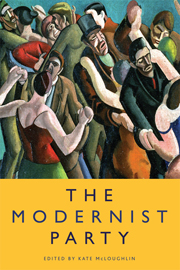Book contents
- Frontmatter
- Contents
- A Note of Thanks
- The Guest List
- Introduction: A Welcome from the Host
- 1 ‘The dinner was indeed quiet’: Domestic Parties in the Work of Joseph Conrad
- 2 Prufrock, Party-Goer: Tongue-Tied at Tea
- 3 Party Joyce: From the ‘Dead’ to When We ‘Wake’
- 4 ‘Looking at the party with you’: Pivotal Moments in Katherine Mansfield's Party Stories
- 5 Virginia Woolf's Idea of a Party
- 6 Proustian Peristalsis: Parties Before, During and After
- 7 ‘Ezra through the open door’: The Parties of Natalie Barney, Adrienne Monnier and Sylvia Beach as Lesbian Modernist Cultural Production
- 8 ‘Indeed everybody did come’: Parties, Publicity and Intimacy in Gertrude Stein's Plays
- 9 The Interracial Party of Modernist Primitivism and the Black ‘After-Party’
- 10 The Party In Extremis in D. H. Lawrence's Women in Love
- 11 Bohemian Retrospects: Ford Madox Ford, Post-War Memory and the Cabaret Theatre Club
- 12 ‘Pleasure too often repeated’: Aldous Huxley's Modernity
- Index
Introduction: A Welcome from the Host
Published online by Cambridge University Press: 05 April 2014
- Frontmatter
- Contents
- A Note of Thanks
- The Guest List
- Introduction: A Welcome from the Host
- 1 ‘The dinner was indeed quiet’: Domestic Parties in the Work of Joseph Conrad
- 2 Prufrock, Party-Goer: Tongue-Tied at Tea
- 3 Party Joyce: From the ‘Dead’ to When We ‘Wake’
- 4 ‘Looking at the party with you’: Pivotal Moments in Katherine Mansfield's Party Stories
- 5 Virginia Woolf's Idea of a Party
- 6 Proustian Peristalsis: Parties Before, During and After
- 7 ‘Ezra through the open door’: The Parties of Natalie Barney, Adrienne Monnier and Sylvia Beach as Lesbian Modernist Cultural Production
- 8 ‘Indeed everybody did come’: Parties, Publicity and Intimacy in Gertrude Stein's Plays
- 9 The Interracial Party of Modernist Primitivism and the Black ‘After-Party’
- 10 The Party In Extremis in D. H. Lawrence's Women in Love
- 11 Bohemian Retrospects: Ford Madox Ford, Post-War Memory and the Cabaret Theatre Club
- 12 ‘Pleasure too often repeated’: Aldous Huxley's Modernity
- Index
Summary
Immanuel Kant's dinner-party
In Anthropology from a Pragmatic Point of View (1798), Immanuel Kant describes how to throw the perfect dinner-party. The company must not number fewer than the graces or more than the muses: a number from three to nine is ‘just enough to keep the conversation from slackening or the guests from dividing into separate small groups with those sitting next to them’. The conversation should proceed through three stages: ‘narration’ (which concerns the news of the day), ‘arguing’ (the exchange of opinions, which ‘stirs up the appetite for food and drink’) and ‘jesting’ (‘the mere play of wit’). Governing all three phases are further injunctions: ‘to choose topics for conversation that interest everyone’, ‘not to allow deadly silences to set in’, ‘not to change the topic unnecessarily’, ‘not to let dogmatism arise’ and, should a serious conflict occur, ‘carefully to maintain discipline over oneself and one's affects’. These matters observed, a dinner-party will combine both physical good (‘good living’) and moral good (‘virtue’), the former derived from fine food and wine, the latter from sociability and enlightenment. But, Kant cautions, a balance must be maintained ‘whereby the inclination to good living is limited by the law of virtue’. Have fun, that is, but not too much fun.
- Type
- Chapter
- Information
- The Modernist Party , pp. 1 - 24Publisher: Edinburgh University PressPrint publication year: 2013

